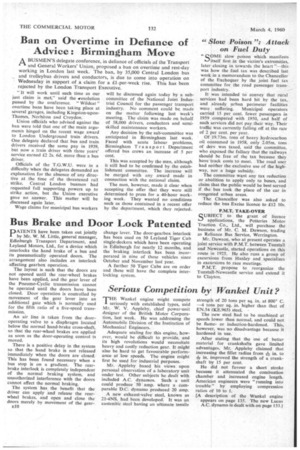Ban on Overtime in Defiance of Advice : Birmingham Move
Page 52

If you've noticed an error in this article please click here to report it so we can fix it.
A BUSMEN'S delegate conference, in defiance of officials of the Transport 4-1 and General Workers' Union, proposed a ban on overtime and rest-day working in London last week. The ban, by 35,000 Central London bus and trolleybus drivers and conductors, is due to come into operation on Wednesday in support of a claim for a £1-per-week rise. This has been rejected by the London Transport Executive.
"It will work until such time as our just claim is met," said the 'resolution passed by the conference. " Wildcat " overtime bans have been taking place at several garages, including Kingston-uponThames, Norbiton and Croydon.
Union officials who advised against the ban were told that one of the main arguments hinged on the recent wage award to London Underground train drivers. One delegate declared that bus and train drivers received the same pay in 1939, but now a train driver with three years' service earned £2 2s. 6d. more than a bus driver.
Officials of the T.G.W.U. were in a difficulty When the delegates demanded an explanation for the absence of any direcfive at the time of the threatened rail strike. Central London busmen had requested full supporting powers up to strike action, but the Union executive gave no answer. This matter will be .discussed again later.
Wage claims for municipal bus workers will be discussed again today by a subcommittee of the National Joint Industrial Council for the passenger transport industry. No comment could be, made on the matter following last week's meeting. The claim was made on behalf of 58,000 drivers, conductors and semiskilled maintenance workers.
Any derision by the sub-committee was anticipated in Birmingham last week. Faced with acute labour problems, Birmingham Transport Department offered bus crews an increase of 5 per cent.
This was accepted by the men, although it still had to be confirmed by the establishment committee. The increase will be merged with any award made in connection with the national claim.
The men, however, made it clear when accepting the offer that they were still determined to press for a 40-hour working week. They wanted no conditions such as those contained in a recent offer by the department, which they rejected.




















































































































